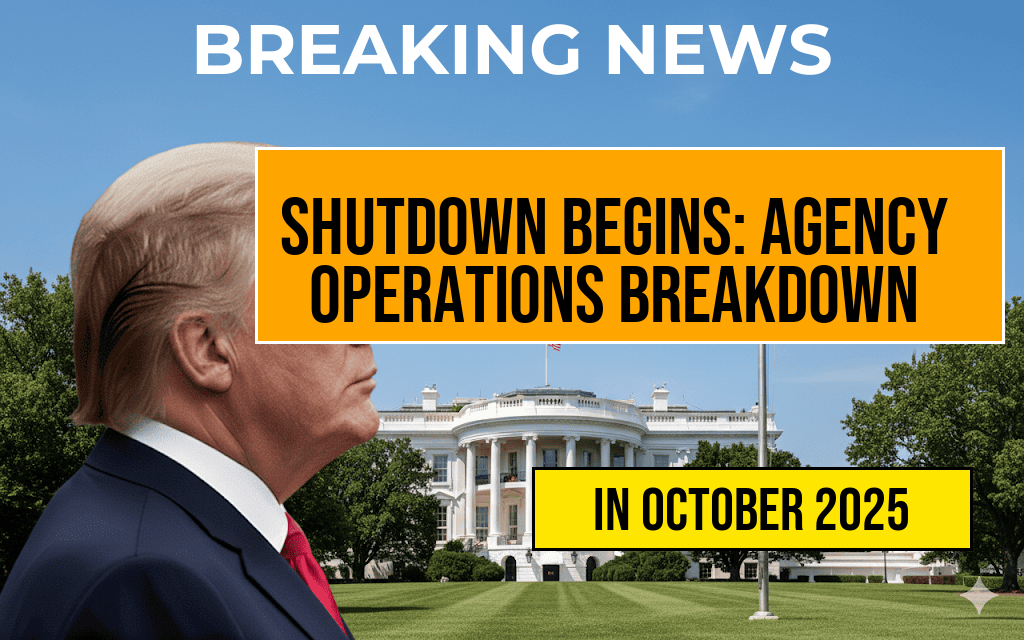The United States government has officially entered a shutdown as congressional negotiations over funding bills have reached an impasse. With federal agencies unable to secure appropriations for the new fiscal year, numerous government operations have suspended or scaled back significantly. Among the agencies affected are critical services such as Social Security, the Internal Revenue Service (IRS), defense operations, and transportation security through the Transportation Security Administration (TSA). While some agencies and services are expected to remain operational through existing funds or essential staffing, others face closures or limited services, creating widespread disruptions across the country.
This shutdown marks the culmination of partisan disagreements over spending priorities, with lawmakers unable to agree on a continuing resolution or full appropriations bill. The consequences will ripple across various sectors, affecting millions of Americans who rely on government services daily. The following breakdown provides a detailed overview of which federal agencies remain operational, which services are on pause, and the scope of impact across different sectors.
Agency-by-Agency Status Overview
Social Security Administration (SSA)
- Status: Operating with limited staff
- Impact: Most Social Security benefits will continue to be processed and distributed without interruption. However, many frontline services, such as in-person assistance at local offices, may be unavailable or limited due to staffing shortages. Automated systems remain functional, ensuring ongoing benefit payments.
Internal Revenue Service (IRS)
- Status: Operating at minimal capacity
- Impact: Processing of tax refunds and critical notices continues, but many customer service functions, including phone support and in-person visits, are suspended. IRS staff involved in audits and enforcement activities are largely furloughed, delaying some ongoing investigations.
Department of Defense (DoD)
| Function | Status | Details |
|---|---|---|
| Active Military Operations | Continuing | All active duty personnel remain on duty; combat and national security operations proceed uninterrupted. |
| Civilian Employees | Partially Furloughed | Many civilian staff are furloughed; essential personnel in critical roles stay on duty. |
| Military Pay | Ensured | Military personnel are expected to receive paychecks on schedule, as funds are protected temporarily. |
Transportation Security Administration (TSA)
- Status: Operating with reduced staffing
- Impact: Airport security checkpoints remain open, but staffing shortages could cause longer wait times and delays. TSA officers are considered essential, so passenger screening continues, but some non-essential services are reduced.
Other Major Agencies
- Environmental Protection Agency (EPA): Most non-essential functions paused; limited inspections and enforcement actions.
- Department of Homeland Security (DHS): Focused on critical infrastructure; some administrative functions halted.
- Federal Emergency Management Agency (FEMA): Continues operations for disaster response and preparedness programs.
- National Parks Service (NPS): Most national parks are closing visitor centers and suspending programs, though emergency services remain active in some areas.
Services That Continue Amid the Shutdown
Federal agencies designated as providing essential services will maintain operations, ensuring continuity for programs deemed vital for public safety and national security. These include military operations, postal services, air traffic control, and emergency response units. Additionally, Social Security and Medicare payments are generally unaffected in the short term, as funds are allocated separately and are not tied to current appropriations bills.
Potential Long-Term Effects and Public Impact
As the shutdown persists, the cumulative effect on the economy and daily life grows more pronounced. Small businesses relying on federal loans and grants may face delays, while individuals awaiting IRS refunds could experience longer processing times. Public confidence in government responsiveness may also wane as frustration mounts over service interruptions. Moreover, federal contractors and employees face uncertainty, with many furloughed without pay until funding is restored.
Broader Political Context
The shutdown underscores ongoing partisan divides in Congress over fiscal policy. Negotiations continue behind closed doors, with lawmakers under pressure to reach an agreement that funds the government and avoids further disruptions. The political impasse has reignited debates over government spending priorities, border security, and debt ceiling negotiations, influencing markets and public trust in governance.
For more information on the current status of federal agencies during shutdowns, visit the official Wikipedia page on U.S. government shutdowns.
Frequently Asked Questions
What agencies are affected by the government shutdown and which ones remain operational?
The government shutdown impacts many agencies, with some halting non-essential services. Key agencies like the Social Security Administration, IRS, and Defense Department experience partial or full closures, while essential services such as Transportation Security Administration (TSA) continue operating to ensure safety and security.
Will I still receive my Social Security benefits during the shutdown?
Yes, Social Security benefits are considered essential and will continue to be paid during the shutdown. Beneficiaries can expect their payments to arrive as scheduled without interruption.
How does the shutdown affect the IRS and tax-related services?
During a government shutdown, many IRS functions, including processing of tax returns and customer service, are limited or paused. This may lead to delays in processing refunds and reduced assistance for taxpayers until full funding is restored.
Is the Defense Department still operating during the shutdown?
The Defense Department continues to operate for essential functions related to national security and safety. However, non-essential activities and administrative functions may be temporarily suspended until funding is restored.
Will TSA and airport security be affected by the shutdown?
No, TSA personnel are considered essential, and airport security screening continues uninterrupted during the shutdown, ensuring travel safety remains a priority.










